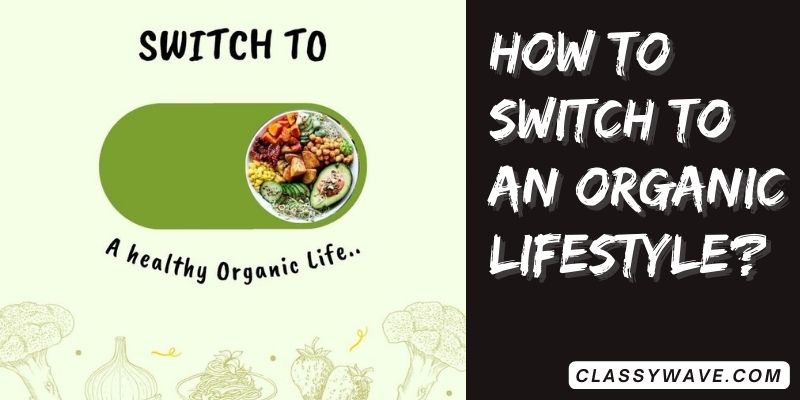how to switch to an organic lifestyle? Complete guide
Embarking on an organic lifestyle involves conscious choices across various facets of life. From sustainable fashion to eco-friendly transportation, mindful water consumption, and organic pet care, these headings encapsulate a holistic journey toward a greener, more sustainable existence. Explore each dimension to embrace an environmentally conscious and socially responsible way of living.
Introduction to the Organic Lifestyle
Explore the principles and values of an organic lifestyle, emphasizing the health and environmental benefits. Understand the importance of making conscious choices in daily living, promoting a holistic approach that extends beyond food choices to encompass various aspects of life.
Transitioning to Organic Foods
Gradually integrate organic fruits and vegetables into your diet. Discover the nutritional advantages and learn how to identify and select organic options at the grocery store, making informed choices that contribute to both personal well-being and sustainable agriculture.
Embracing Organic Farming Practices
Initiate a small-scale organic garden at home, cultivating an understanding of sustainable agriculture. Support local farmers committed to organic farming practices, fostering a connection with the origins of your food and promoting environmental stewardship.
Switching to Organic Personal Care Products
Explore alternatives in skincare, haircare, and personal hygiene that prioritize organic and natural ingredients. Recognize the importance of reducing exposure to synthetic chemicals, and embracing products that align with your commitment to a healthier, more environmentally friendly lifestyle.
Creating an Organic Home Environment
Choose organic and eco-friendly materials for your home, fostering a living space that aligns with your commitment to sustainability. Implement green practices in household cleaning and maintenance, creating a harmonious and environmentally conscious living environment.
Mindful Consumption and Waste Reduction
Adopt a minimalist approach to reduce unnecessary consumption, emphasizing quality over quantity. Explore strategies for waste reduction, including composting and recycling, to minimize your ecological footprint and contribute to a more sustainable way of life.
Educating Yourself on Organic Certifications
Gain an understanding of the various certifications for organic products, empowering yourself to make informed purchasing decisions. Recognize trustworthy organic labels, ensuring that your choices align with certified standards for organic and sustainable practices.
Connecting with the Organic Community
Join local organic groups or communities to share experiences and insights. Build connections with like-minded individuals, fostering a sense of community that provides support and encouragement throughout your journey toward a more organic lifestyle.
Overcoming Challenges in the Organic Transition
Address common obstacles and misconceptions associated with adopting an organic lifestyle. Find practical solutions to budget constraints and accessibility issues, empowering yourself to navigate challenges and stay committed to your goals.
Tracking Progress and Celebrating Achievements
Set personal goals for embracing the organic lifestyle and monitor your progress. Celebrate achievements, both big and small, as you successfully integrate organic practices into various aspects of your life, creating a positive and sustainable impact on your well-being and the environment.
Exploring Organic Clothing and Fabrics
Dive into the world of sustainable fashion by exploring organic clothing and fabrics. Learn about eco-friendly materials, such as organic cotton, hemp, and bamboo, and discover ethical practices in the fashion industry. Embrace a wardrobe that aligns with your commitment to environmental responsibility, promoting a more sustainable and socially conscious approach to personal style.
Sustainable Transportation Choices
Make a positive impact on the environment by adopting sustainable transportation choices. Explore eco-friendly options like biking, walking, or using electric vehicles to reduce your carbon footprint. By prioritizing green commuting methods, you contribute to a healthier planet and promote a more sustainable lifestyle.
Mindful Water Consumption Habits
Cultivate mindful water consumption habits to reduce your environmental impact. Explore water-saving techniques, fix leaks promptly, and consider installing efficient fixtures. Recognize the importance of responsible water usage in your daily life, contributing to the conservation of this vital resource for a sustainable future.
Organic Pet Care Practices
Extend your organic lifestyle to pet care by exploring natural and eco-friendly products. Choose organic pet food and grooming items that prioritize the health and well-being of your furry friends while minimizing the environmental impact. Embrace sustainable pet care practices to create a harmonious living environment for both you and your pets.
Green Energy and Renewable Resources
Embrace a greener lifestyle by exploring green energy options and renewable resources. Investigate solar, wind, and hydroelectric power to reduce reliance on non-renewable energy sources. By incorporating sustainable energy practices into your daily life, you contribute to a cleaner, more environmentally friendly energy landscape.
Conclusion
In conclusion, adopting an organic lifestyle is a transformative journey that extends beyond food choices. By exploring sustainable fashion, eco-friendly transportation, water conservation, organic pet care, and renewable energy, one can create a harmonious, environmentally conscious existence. These choices contribute to a healthier planet and a more sustainable future, reflecting a commitment to responsible living and fostering a positive impact on both personal well-being and the global environment.
FAQs
Question: How can I afford an organic lifestyle on a budget?
Answer: Embrace cost-effective options, buy in bulk, and prioritize essentials to make organic living more budget-friendly.
Question: What are the benefits of organic clothing?
Answer: Organic clothing uses eco-friendly materials, reducing environmental impact and promoting sustainable practices in the fashion industry.
Question: How can I save water at home?
Answer: Fix leaks promptly, install water-efficient fixtures, and practice mindful habits like turning off taps while brushing.
Question: Is organic pet care essential for my pets?
Answer: Yes, organic pet care minimizes exposure to harmful chemicals, promoting the health and well-being of your furry companions.
Question: Are electric vehicles truly sustainable?
Answer: Electric vehicles reduce emissions and reliance on fossil fuels, making them a more sustainable transportation option for environmentally conscious individuals.







